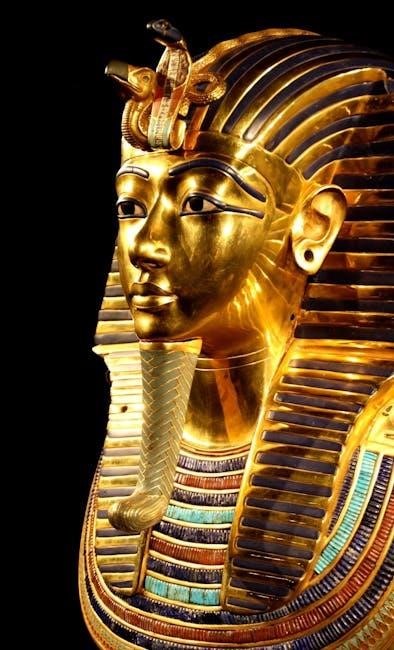
Based on his 2003 CBC Massey Lectures, The Truth About Stories by Thomas King explores the power and danger of stories in shaping culture and identity․
1․1 Overview of the Book and Its Significance
Winner of the 2003 Trillium Book Award, The Truth About Stories: A Native Narrative by Thomas King is a compelling exploration of storytelling’s role in shaping identity and culture․ Originating from King’s 2003 CBC Massey Lectures, the book masterfully intertwines traditional Indigenous oral stories with broader themes of literature, history, and politics․ King emphasizes that stories are both wondrous and dangerous, reflecting their power to inspire and mislead․ This work is significant for its insightful commentary on the intersection of narrative and societal perceptions, making it a cornerstone of contemporary discussions about storytelling and its impact on human understanding․
1․2 Thomas King’s Background and Contributions to Native Literature
Thomas King, a renowned Indigenous author and scholar, has profoundly shaped Native literature with his unique voice and perspective․ Born in 1943, King blends storytelling traditions with contemporary themes, addressing identity, culture, and colonialism․ His works, such as Green Grass, Running Water and The Truth About Stories, highlight the richness of Indigenous narratives while challenging stereotypes․ A professor and broadcaster, King’s contributions extend beyond literature, influencing broader cultural discussions․ His ability to weave traditional oral stories into modern contexts has made him a pivotal figure in preserving and promoting Indigenous voices, earning him numerous accolades and a lasting impact on literary landscapes․

The Role of Storytelling in Native Cultures
Storytelling in Native cultures preserves history, cultural values, and traditions․ It serves as a communal activity, passing knowledge through generations and connecting people spiritually to their heritage․
2․1 Traditional Native Oral Stories and Their Importance
Traditional Native oral stories are vital for preserving cultural identity and historical memory; They encapsulate moral lessons, historical events, and spiritual beliefs, serving as a collective memory․
2․2 Storytelling as a Means of Preserving History and Culture
Storytelling is a cornerstone of Native cultures, serving as a repository of history, traditions, and beliefs․ Through oral narratives, communities preserve their collective memory, conveying values and cultural identity․ King emphasizes that these stories are not mere entertainment but vital records of historical events, spiritual teachings, and societal norms․ They ensure the continuity of cultural heritage, allowing future generations to connect with their roots․ By sharing stories, Native cultures maintain their distinct identities and resist cultural erasure, ensuring their history and traditions remain alive and relevant in contemporary society․

The Impact of Storytelling on Identity and Society
Stories shape individual and collective identity, reflecting cultural values, histories, and beliefs․ They influence societal perceptions, fostering empathy or division, and are vital for understanding human experiences․
3․1 How Stories Shape Individual and Collective Identity
In The Truth About Stories, Thomas King illustrates how stories define who we are, both as individuals and communities․ They carry cultural values, histories, and beliefs, shaping self-perception and shared identity․ King emphasizes that stories are not just entertainment but reflections of our collective soul․ They preserve traditions, explain the world, and connect generations․ Through storytelling, individuals find their place within broader narratives, while communities maintain their cultural heritage․ King’s work highlights how these narratives influence personal growth and societal cohesion, underscoring their role in forming identity and fostering understanding across diverse cultures․
3․2 The Power of Stories in Shaping Societal Perceptions and Attitudes
Thomas King underscores how stories profoundly influence societal perceptions and attitudes, serving as tools to shape understanding and interaction․ Stories can perpetuate stereotypes or challenge them, affecting how groups view themselves and others․ King highlights the dual nature of stories: while they unite people, they can also divide by fostering misunderstandings or reinforcing biases․ By examining historical narratives, King reveals how stories have been used to justify injustices or celebrate diversity․ His work emphasizes the responsibility that comes with storytelling, urging us to critically engage with the stories that define our societies and attitudes toward others․

The Truth About Stories: Key Themes and Messages
Thomas King explores the dual nature of stories: their power to inspire and educate, but also to mislead and control․ He emphasizes storytelling’s role in preserving culture․
4․1 The Wondrous and Dangerous Nature of Stories
Thomas King highlights the dual nature of stories, noting their ability to inspire and educate, while also cautioning against their power to manipulate and mislead․ He illustrates this duality through traditional Native oral stories, emphasizing how they can both preserve culture and perpetuate harmful stereotypes․ King asserts that stories are not neutral; they carry immense power to shape perceptions and influence societal attitudes․ This duality underscores the responsibility that comes with storytelling, urging listeners to critically engage with the narratives they encounter․ King’s exploration of this theme resonates deeply, offering a nuanced perspective on the role of stories in human experience․
4․2 The Intersection of Literature, History, and Politics in Storytelling
Thomas King delves into how storytelling intertwines with literature, history, and politics, shaping cultural narratives and public opinion․ He examines historical accounts and literary works, revealing how they often reflect dominant perspectives while marginalizing Indigenous voices․ King argues that stories are not just entertainment but tools of influence, used to justify colonialism and oppression․ By weaving together personal anecdotes, historical events, and literary analysis, King demonstrates how storytelling can both uphold and challenge power structures․ This intersection underscores the importance of critically examining the stories we consume and the histories they represent․

The Reception and Legacy of the Book
The Truth About Stories received critical acclaim, winning the 2003 Trillium Book Award․ It has significantly influenced contemporary discussions on storytelling, identity, and cultural narratives, becoming a landmark work in Native literature․
5․1 Critical Acclaim and Awards
The Truth About Stories earned widespread critical acclaim for its insightful exploration of storytelling’s role in culture and identity․ The book won the prestigious 2003 Trillium Book Award, recognizing its literary excellence and contribution to Canadian literature․ King’s unique blend of personal narratives, historical analysis, and cultural critique resonated deeply with readers and scholars alike, solidifying its place as a seminal work in contemporary Native studies․ The award underscores the book’s impact in fostering meaningful discussions about storytelling’s power and its influence on societal perceptions and individual identities․

5․2 The Book’s Influence on Contemporary Discussions About Storytelling
The Truth About Stories has profoundly influenced modern conversations on storytelling, particularly in Native studies and beyond․ King’s lectures, broadcast on CBC Radio, reached a broad audience, sparking discussions about how stories shape identity and culture․ Educators and scholars have embraced the book, integrating it into curricula and academic discourse․ Its themes resonate in contemporary debates about representation, cultural preservation, and the role of storytelling in addressing social justice issues․ The work continues to inspire new generations, fostering a deeper understanding of storytelling’s enduring power and relevance in today’s world․

Accessing “The Truth About Stories” in PDF and Other Formats
The book is available in PDF and other formats on platforms like Open Library and Scribd, offering easy access for readers worldwide․
Western Canadian Learning Network (WCLN) also provides digital resources, making it convenient for educational purposes and personal reading․
6․1 Reliable Platforms for Downloading the PDF Version
The Truth About Stories by Thomas King can be accessed in PDF format through reliable platforms like Open Library, which offers over 1 million eBooks, and Scribd, a leading social reading site․
Western Canadian Learning Network (WCLN) also provides digital resources for educational purposes, making it accessible for students and educators․ Additionally, platforms like House of Anansi Press and Google Books offer preview versions for research․
Always ensure to use official sources to respect copyright and download high-quality versions legally and ethically․
6․2 Educational Resources and Study Guides Available Online
Educational resources and study guides for The Truth About Stories are widely available online․ Platforms like TeachingBooks offer original and curated content, including author interviews and lesson plans, to deepen understanding of the text․
Western Canadian Learning Network (WCLN) provides Moodle-based resources for educators, while websites like Google Classroom and Moodle host study guides, summaries, and discussion prompts․
These tools enable teachers to integrate the book into curricula effectively, fostering critical thinking and cultural awareness among students․